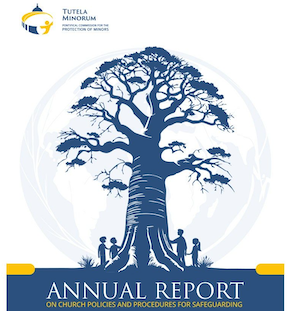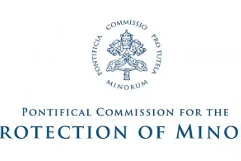Church publishes Second Protection of Minors Report

The Second Annual Report on Safeguarding Policies in the Catholic Church, was published today by the Pontifical Commission for the Protection of Minors. The document presents guidelines for "informed listening" and for economic, psychological, and spiritual support to victims, while highlighting the need for more transparent communication, public acceptance of responsibility by the Church, and streamlined reporting mechanisms.
The guidelines are intended to help ecclesial communities implement "restorative measures," following step by step the reporting process and calling for its general simplification.
Recommendations include an initial "informed listening," access to information about one's case, and economic, psychological, and spiritual support. All of this is to be accompanied by transparent official statements that "acknowledge the harm caused" and publicly assume responsibility.
Archbishop Thibault Verny, President of the Pontifical Commission, whom Pope Leo XIV appointed in July, described this mission as a "perpetual pilgrimage."
As in the First Annual Report, the study was drafted through consultation with the Commission's Annual Report Focus Group composed of survivors of abuse.
Formed on a voluntary basis, the group's members were selected according to diversity in age, gender, and ethnic background, and included participants from four global regions. Additional data were collected from non-ecclesial organizations.
Among the key issues that emerged were the "need for a more listening Church" and the "lack of clear structures for reporting and whistleblowing."
The first part of the Report focuses on restorative measures for victims of abuse, based on "informed listening" and proportional to the harm suffered.
The 'vademecum' (guide) for local communities calls first of all for the creation of "safe spaces" where victims can share their experiences, including directly with ecclesial authorities.
It analyzes the concept of "reparation," which the Encyclical Dilexit nos describes not only as "an individual duty, but a shared responsibility of the entire community-excluding only the victims/survivors-aimed at fostering an environment of care and mutual respect."
The Church is thus called to issue official statements that "acknowledge the harm caused" and publicly accept its own responsibility.
The Report then addresses the issue of support, developed across several areas, to ensure professional counseling and spiritual accompaniment for victims/survivors, "with particular attention to the long term."
This includes appropriate financial assistance for expenses incurred as a result of abuse, including medical and psychological care. The vademecum also calls for strengthening the protection of victims through the imposition of significant sanctions on those who have committed or facilitated abuse.
Victims "should not be left in uncertainty regarding the assumption of responsibility by perpetrators of abuse and by those who enabled or covered it up."
The Report emphasises the "fundamental" need for victims to access information about their own cases, a key element in the healing process, and calls for awareness programs directed toward clergy, religious, and lay faithful to promote "a process of collective healing."
Among other significant findings, the Commission reiterates the importance of developing a "simplified procedure" for the removal of Church leaders involved in "past administrative actions and/or inactions that have caused further harm to victims/survivors."
It also recommends "clear communication" regarding the reasons for resignations or removals, as well as effective assessment of progress made by local Churches and religious orders in implementing safeguarding policies.
To this end, the Commission proposes the creation of an "international academic network" involving Catholic universities specializing in human rights, abuse prevention, and safeguarding, to collect relevant data in the countries covered by the Report.
The Report further suggests establishing a "systemic and mandatory reporting mechanism" to be used by safeguarding bodies at the local level.
The ecclesial community, it observes, has the capacity to "promote greater transparency and the exercise of institutional accountability," in line with Pope Francis's request to provide "a reliable account of what is happening and of what still needs to change, so that competent authorities can act."
Finally, the Report reaffirms the key role of Apostolic Nuncios within local Churches, as support and accompaniment in the "ministry of safeguarding."
In Section 1, the Report examines safeguarding activities in local Churches of several countries, including Italy, Gabon, Japan, Equatorial Guinea, Ethiopia, Guinea (Conakry), Bosnia-Herzegovina, Portugal, Slovakia, Malta, Korea, Mozambique, Lesotho, Namibia, Mali, Kenya, Greece, and the Regional Episcopal Conference of North Africa (which includes Algeria, Morocco, Western Sahara, Libya, and Tunisia).
The data are based on the analysis of information gathered through the Commission's ad limina process, supplemented by other sources.
In Italy, visits were made to the dioceses of Lazio, Liguria, Lombardy, Sardinia, Sicily, Emilia-Romagna, and Tuscany. Over the years, the Report notes, significant progress has been made in developing "integrated tools and policies" for prevention and protection.
The Commission recognizes the work of the Italian Bishops' Conference (CEI) in creating a multilevel system (national, regional, diocesan, and interdiocesan) for "coordination, training, and supervision," designed to support local Churches with professional and adequately trained personnel.
The Conference reports the existence of 16 regional safeguarding services, 226 diocesan and inter diocesan services, and 108 listening centres, which provide pastoral assistance and receive reports.
Challenges remain. The Commission observes that, although some local Churches have pioneered initiatives and collaborations with civil society, there persist "disparities among regions" and the absence of a centralised office for receiving and analysing reports - a structure necessary to ensure consistent and effective case management.
Globally, the document notes that while some Churches in the Americas, Europe, and Oceania demonstrate strong commitment to reparation, there is also an "over reliance on financial compensation," which risks limiting a "holistic understanding" of the healing process. Moreover, in many parts of Central and Latin America, Africa, and Asia, resources for accompanying victims/survivors remain insufficient.
Nevertheless, several exemplary practices are highlighted, such as: the traditional community healing practice Hu Louifi in Tonga; the annual report on victim accompaniment services in the United States; the ongoing guideline review processes in Kenya, Malawi, and Ghana; and the truth-finding project "The Courage to Look" (Il coraggio di guardare) in the Diocese of Bolzano-Bressanone.
The third section of the document explores the competencies of the Roman Curia in matters of safeguarding, promoting an interdicasterial approach.
The Report particularly examines the contribution of the Dicastery for Evangelisation - Section for the First Evangelisation and the New Particular Churches, which supports local ecclesial communities in various territories, overseeing not only general administration but also safeguarding initiatives.
This Section assists around 1,200 ecclesiastical jurisdictions and participated actively in drafting the Report.
Section 4 is dedicated to analyzing the Church's social dimensions, highlighting initiatives that promote the rights of minors and vulnerable adults.
This year's edition introduces a pilot methodology, applied to the lay association Work of Mary - Focolare Movement. The Commission welcomes the reforms recently adopted by the Movement, such as: the establishment of an independent central commission for managing abuse cases; a policy on information about sexual abuse; and guidelines for victim support and financial reparation.
The final part of the document focuses on the progress of the Memorare Initiative. Established by the Commission in 2022, it has gathered dedicated funds from Bishops' Conferences, religious orders, and philanthropic foundations to support Churches in the Global South with limited resources.
Currently, 20 agreements are in place to support local Memorare Initiatives worldwide, and about a dozen more are under negotiation.
Among the participating regions are: Rwanda, Venezuela, the Archdiocese of Mexico City (Mexico), AMECEA - Association of Members of the Episcopal Conferences of Eastern Africa, the Ecclesiastical Province of Chubut (Argentina), Honduras, Uruguay, Haiti, the Ecclesiastical Province of Mombasa (Kenya), the Ecclesiastical Province of San Luis Potosí (Mexico), Tonga, the Central African Republic, Malawi, the Ecclesiastical Province of Paraná (Argentina), Paraguay, IMBISA - Inter-Regional Meeting of Bishops of Southern Africa, Panama, the Ecclesiastical Province of Santa Fe (Argentina), Costa Rica, and Zimbabwe.
Read the full report here: www.tutelaminorum.org/wp-content/uploads/2025/10/Inglese_web.pdf


















